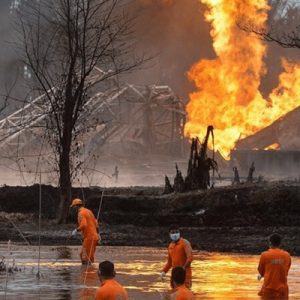On 13 September, almost four months after the explosion and oil spill in the Indian town of Baghjan (Tinsukia district, Assam state), experts from the company in charge of the oil well (Oil India Limited) and international engineers managed to control the fire.
Four days earlier, an engineer from the company had died on site. He was the third employee to lose his life whilst working to contain the damage caused by the explosion on 27 May. Since the fire started, the company has been denounced for irregular operations in the well.
The disaster took place in well No. 5, one of 22 crude oil and natural gas wells in the Baghjan oil deposit, located near the Dibru Saikhowa national park and the Maguri-Motapung wetlands. The area is home to several protected species, among them tigers, Gangetic dolphins and elephants.
“The continuous gas and oil leak has resulted in a massive fire which has unleashed an adverse effect on the biodiversity of this area, threatening the lives, property and livelihoods of the local population,” said activist Jibin Robin in an interview with Real World Radio a few weeks ago. Robin is a member of the Delhi Solidarity Group [1] based in New Delhi. The organisation brings together individuals and collectives that provide solidarity support to social movements and struggles around the country.
“According to the researchers, it will take close to 10 to 15 years for the land to be fertile and ready for cultivation. Close to 11,000 people have been displaced and should to be compensated. This wetland was also home to 30-40 different species of birds,” added Robin.
On 1 July, the Delhi Solidarity Group joined environmental network Friends of the Earth Asia Pacific [2], which has member groups in several countries across the region, to issue a press release [3] titled “Extinguish the fire and clean up the mess now. Immediate action must be taken to douse the fire at Baghjan oil well in the Tinsukia district of Assam.” The case “highlights the ongoing pattern of corporate negligence and governmental leniency in India,” warns the press release.
In the interview with Real World Radio, Robin exposed that “Oil India Limited functions on their own basically. There is no license for the drillings, they never held a public hearing to set up these wells.”
The activist added that the corporation, which is a well-known company in India’s hydrocarbon sector, has a track record. He lamented the death of company workers who were trying to contain the fire or do other work after the explosion, and recounted that some local inhabitants even committed suicide after losing everything in the fire. Some members of the local community have protested, demanding the arrest of Oil India Limited’s Chair, Shri Sushil Chandra Mishra.
Robin also reaffirmed the demands established in the press release issued by the Delhi Solidarity Group and Friends of the Earth Asia Pacific on 1 July. These demands include to: form a committee to conduct a thorough and transparent investigation into the reasons for the outbreak of the fire; hold all companies exploiting natural resources in the region to account for social impacts and irreversible loss of biodiversity due to their operations; take strict actions against Oil India Limited, and immediately halt all oil mining activities within National Parks in India; urgently clean-up the village areas, bodies of water and air contaminated by the oil spill; and provide immediate financial and housing assistance to the affected families and victims of Baghjan.
